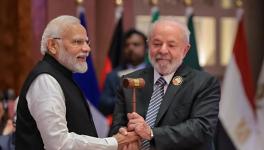Over 900,000 Brazilians Sign Letter in Defense of Democracy
Reading of the letter in defense of democracy at the Faculty of Law in the University of Brasília, in Brazil's capital city. Photo: Janelson Ferreira/MST
On Thursday August 11, tens of thousands of Brazilians took to the streets in defense of free elections and against political violence and to launch the “Letter to Brazilians in defense of the Democratic State of Law”. The actions organized by the “Out Bolsonaro” campaign, a coalition of diverse people’s movements, trade unions, and civil society organizations, have estimated that actions were organized in at least 49 cities, including almost all the capitals of the country.
The official launch of the letter, which has over 925,000 signatures, took place at 10am at the Law School of University of São Paulo in Largo São Francisco, São Paulo.
“Since Bolsonaro took office, we have been organizing in the [Out Bolsonaro] campaign to organize actions in defense of democracy, to raise the issues of vaccines, to denounce hunger, unemployment. And now, we are back in the streets against the escalation of authoritarianism, with the threat of [Bolsonaro] not respecting the elections, that is, not respecting the popular sovereignty of the vote. [He even] announced to the world in that meeting with the ambassadors that the electronic ballot box is not safe,” said Raimundo Bonfim, coordinator of the Central of Popular Movements (CMP) and one of the organizers of the campaign, which includes the Popular Brazil Front and the People Without Fear Front, in addition to dozens of other entities.
Understanding the context
The “Letter to Brazilians in defense of the Democratic Rule of Law” was prepared by a group of former students of the Law Faculty at University of São Paulo and makes reference to the 45th anniversary of the “Letter to Brazilians”, from 1977, when a movement led by professor Goffredo da Silva Telles Junior denounced the illegitimacy of the military government.
In a video circulating on social networks, several personalities confirmed that they will be participating in acts at law schools across the country where the letter will be read. These include: Arnaldo Antunes, Douglas Belchior, Walter Casagrande, Alexandre Frota, Preta Rara, Father Julio Lancellotti, Astrid Fontenelle, Marina Person, Alessandra Negrini, Sabrina Fidalgo, and André Abujamra.
By the morning of Thursday August 11, the letter had over 925,000 signatures, including those of eight presidential candidates: Lula, Ciro Gomes, Simone Tebet, Felipe D’Ávila, Soraya Thronicke, Sofia Manzano, Leonardo Péricles, and Eymael. Current president and candidate for re-election Jair Bolsonaro did not sign the document and criticized the initiative.
The letter gained more political weight in Brazil when names of the national financial elite declared their signatures. People like bankers Roberto Setubal and Pedro Moreira Salles, co-chairmen of the board of directors of Itaú Unibanco, Candido Bracher, former Chief Executive Officer of Itaú, and Fabio Barbosa, CEO of Natura, joined the initiative.
In addition, on Wednesday a group of 42 artists published a video reading the letter. Among them are Chico Buarque, Fernanda Montenegro, Caetano Veloso, Anitta, Milton Nascimento, Djavan, Dira Paes and Wagner Moura.
Responses to Bolsonaro’s attacks
The letter is considered a response to what many call threats of a coup by Bolsonaro. “Groundless attacks unaccompanied by evidence question the fairness of the electoral process and the democratic rule of law so hard won by Brazilian society. Threats to other powers and sectors of civil society and the incitement to violence and the breakdown of the constitutional order are intolerable,” reads an excerpt from the document.
The text was released eight days after Bolsonaro’s meeting with foreign ambassadors, in which he repeated accusations that have already been refuted about fraud in the elections.
Fraud attempts
According to the G1 website, the server that hosts the letter had already suffered, from the launch until the afternoon of Wednesday, almost 20,000 attempted intrusions. The attorney general of the Public Ministry of Accounts of São Paulo, Thiago Pinheiro Lima, one of the creators of the movement, said that on August 10, a hacker tried to bring down the site by creating a bot that attempted 8 million simultaneous accesses on the site “Estado de Direito”.
According to Lima, they already expected the attacks and security mechanisms were implemented and have been able to prevent unauthorized accesses to the system.
Read the full letter below:
Letter to Brazilians in defense of the Democratic Rule of Law
In August 1977, amidst the celebrations of the sesquicentennial of the foundation of the Law Schools in Brazil, professor Goffredo da Silva Telles Junior, master of all of us, in the free territory of Largo de São Francisco, read the Letter to Brazilians, in which he denounced the illegitimacy of the then military government and the state of exception in which we lived. It also called for the re-establishment of the rule of law and the convening of a National Constituent Assembly.
The seed planted bore fruit. Brazil overcame the military dictatorship. The National Constituent Assembly rescued the legitimacy of our institutions, reestablishing the democratic rule of law with the prevalence of respect for fundamental rights.
We have the powers of the Republic, the Executive, the Legislative and the Judiciary, all independent, autonomous and committed to respecting and ensuring compliance with the greater covenant, the Federal Constitution.
Under the mantle of the Federal Constitution of 1988, which is about to complete its 34th anniversary, we went through free and periodic elections, in which the political debate on projects for the country has always been democratic, with the final decision being left to popular sovereignty.
Goffredo’s lesson is embodied in our Constitution “All power emanates from the people, who exercise it through their elected representatives or directly, under the terms of this Constitution”.
Our elections with the electronic counting process have served as an example in the world. We had several alternations of power which respected the results of the polls and led to a republican transition of government. Electronic voting machines, as well as the Electoral Justice, proved to be safe and reliable.
Our democracy has grown and matured, but much remains to be done. We live in a country of profound social inequalities, with deficits in essential public services, such as health, education, housing and public safety. We have a long way to go in developing our economic potential in a sustainable way. The State is inefficient in the face of its numerous challenges. Demands for greater respect and equality of conditions in terms of race, gender and sexual orientation are still far from being fully met.
In the coming days, in the midst of these challenges, we will have the beginning of the electoral campaign to renew the mandates of state and federal legislatures and executives. At this moment, we should have the apex of democracy with the dispute between the various political projects aimed at convincing the electorate of the best proposal for the direction of the country in the coming years.
Instead of a civic celebration, we are going through a moment of immense danger to democratic normality, of risk to the institutions of the Republic and of insinuations of contempt for the results of the elections.
Groundless attacks unaccompanied by evidence question the fairness of the electoral process and the democratic rule of law so hard won by Brazilian society. Threats to other powers and sectors of civil society and the incitement to violence and the breakdown of the constitutional order are intolerable.
We have recently witnessed authoritarian rants that have jeopardized secular American democracy. There, attempts to destabilize democracy and the people’s confidence in the fairness of the elections were unsuccessful. Here, they won’t be either.
Our civic conscience is much greater than the opponents of democracy imagine. We know how to put aside minor differences in favor of something much bigger, the defense of the democratic order.
Imbued with the civic spirit that underpinned the 1977 Letter to Brazilians and gathered in the same free territory of Largo de São Francisco, regardless of the electoral or partisan preference of each one, we call on Brazilians to be alert in the defense of democracy and respect for the election result.
In today’s Brazil there is no more room for authoritarian setbacks. Dictatorship and torture belong to the past. The solution to the immense challenges facing Brazilian society necessarily involves respect for the results of the elections.
In civic vigil against attempts at ruptures, we cry out in unison:
Democratic Rule of Law Always!!!!
Original article in Portuguese on Brasil de Fato.
Get the latest reports & analysis with people's perspective on Protests, movements & deep analytical videos, discussions of the current affairs in your Telegram app. Subscribe to NewsClick's Telegram channel & get Real-Time updates on stories, as they get published on our website.
























